Data runs every WooCommerce store.
Products, orders, customers, coupons, every click and purchase creates information you’ll eventually need outside your dashboard. Maybe it’s for accounting, maybe for marketing, maybe just to keep your records clean.
And here’s the truth: exporting that data should be simple, but in WooCommerce it rarely feels that way.
You either end up with CSVs full of gaps, fields you don’t need, or hours wasted trying to clean and filter spreadsheets.
WooCommerce exports aren’t just about “getting data out.” They’re about making your store manageable, reporting accurate and growth decisions faster.
In this guide, we’ll go step by step through WooCommerce’s default export options, what you can and can’t export and then explore a smarter way to handle everything from products to orders to memberships without the usual CSV chaos.
How to export in WooCommerce without a plugin?
WooCommerce core only gives you a basic product exporter. If all you need is a quick CSV of products, it works fine.
Here’s how to export all of your products:
- Go to
WordPress Admin > WooCommerce > Products. - At the top, click
Export. - Choose which columns (fields) you want to export.
- Select product types (simple, variable, grouped) and product categories and custom meta, if needed.
- Click
Generate CSV.
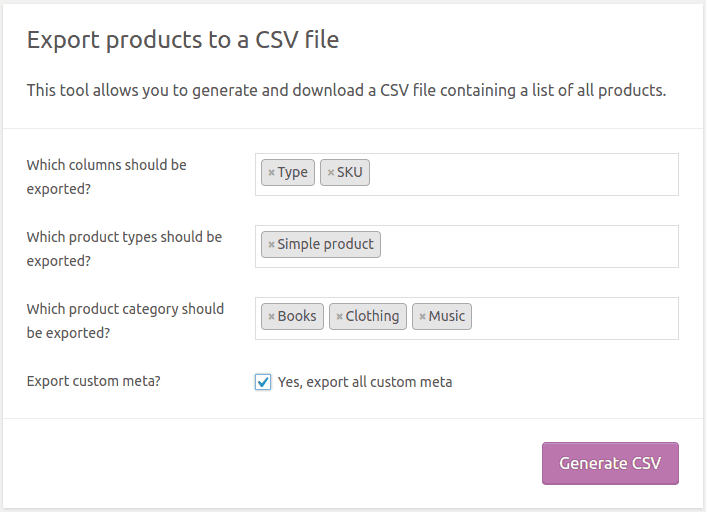
This will give you a spreadsheet with product data like name, SKU, price, stock, categories and tags.
For orders, customers, or users, WooCommerce doesn’t provide a built-in CSV exporter. The only option in core is through WordPress Tools > Export, which generates an XML file.
You can export things like:
- Orders
- Customers (users)
- Posts, pages, or custom post types
But XML exports are mainly for site migration or backups, they’re not practical if you just want a clean spreadsheet for analysis or campaigns.
Basically, you can use WooCommerce default options to export product only for small stores and having a very small product catalog.
But as soon as you need variations, filtered lists, recurring exports, or third-party data, the cracks start to show.
That’s where Smart Manager comes in, giving you flexible, powerful export options that go way beyond basic CSVs.
Smart Manager – Your all-in-one, advanced WooCommerce export plugin
When your store grows, exporting data isn’t just about dumping a CSV. You need clean, filtered and complete files you can actually use. That’s exactly what Smart Manager is built for.
It works like an Excel sheet inside your WooCommerce dashboard. It allows you to search, filter and export thousands of records in seconds, without messy spreadsheets or missing data.
Here’s why it’s smarter:
- Export all data.
- Advanced search to export only what you need.
- Export products, orders, customers, coupons and more in one place.
- Works with third-party plugins like Bookings for WooCommerce, Subscriptions for WooCommerce, Memberships for WooCommerce and many more.
- No record limits, handles thousands of rows at once.
- Export custom fields and meta data.
- Clean, ready-to-use CSV or Excel files with a click.
- Easily import products to your WooCommerce store within a few minutes.
Now let’s look at some real examples of how Smart Manager makes exporting WooCommerce data simple and useful for your store.
Export all products with Smart Manager
Let’s say you want a complete list of your products, how many are in stock and their costs so you can review inventory levels and plan your next sales push.
Instead of checking every product one by one, here’s how to do it with Smart Manager:
- Go to
Smart Manager > Products dashboard. - Click
Export CSV. - From the dropdown, select
Entire Store – Stock Columns.
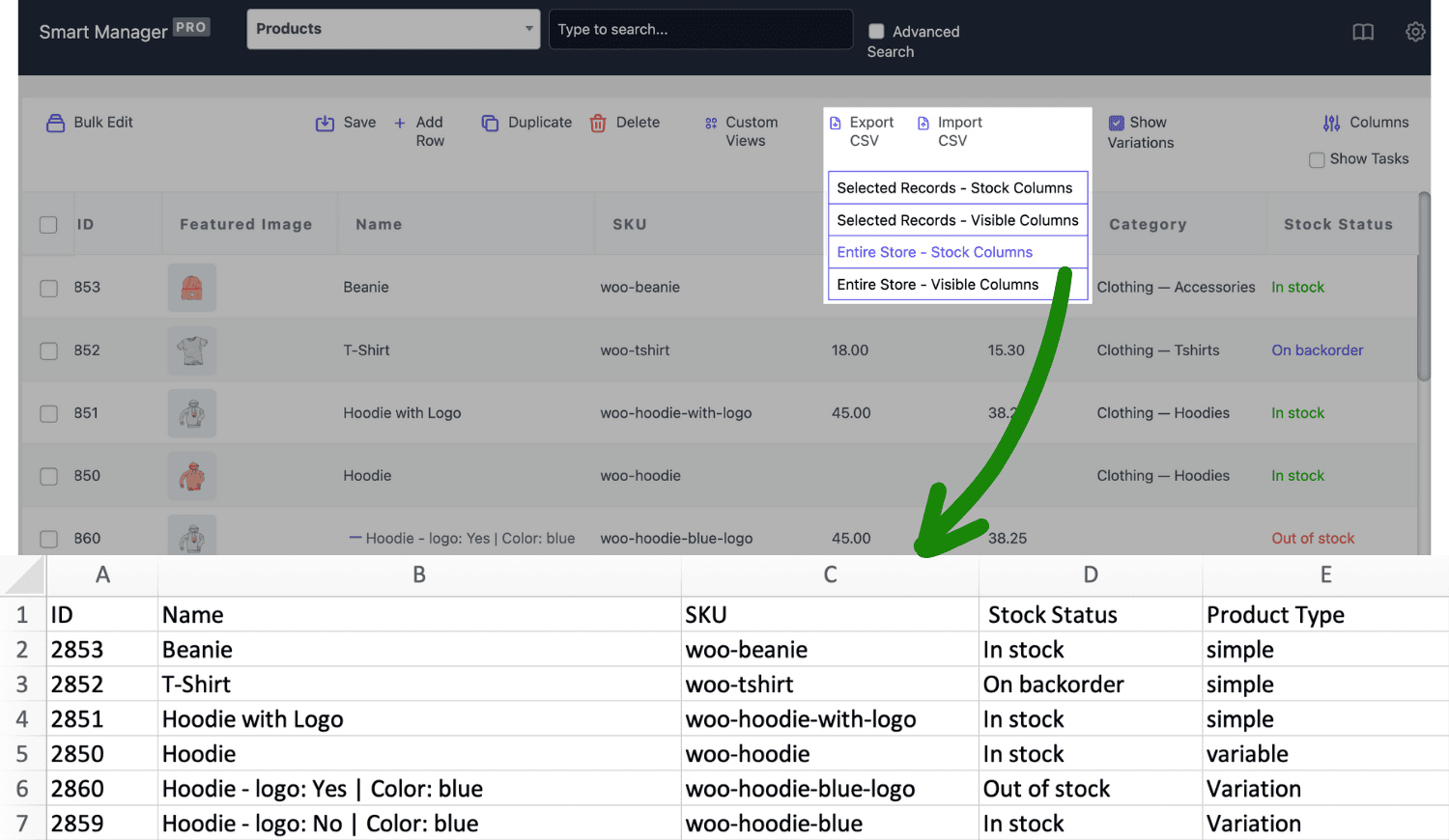
And you’re done. A full product list is saved to CSV in seconds.
WooCommerce export products based on price and stock
Say you want to review products that are running low on stock (less than 1000 items) and also priced under $50.
Here’s how you can do this:
- Go to
Smart Manager > Products dashboard. - Click on
Advanced Search. - Set conditions:
Stock < 1000 and Regular Price < 50. - Click
Search. - Hide any unwanted columns and click
Export CSV.
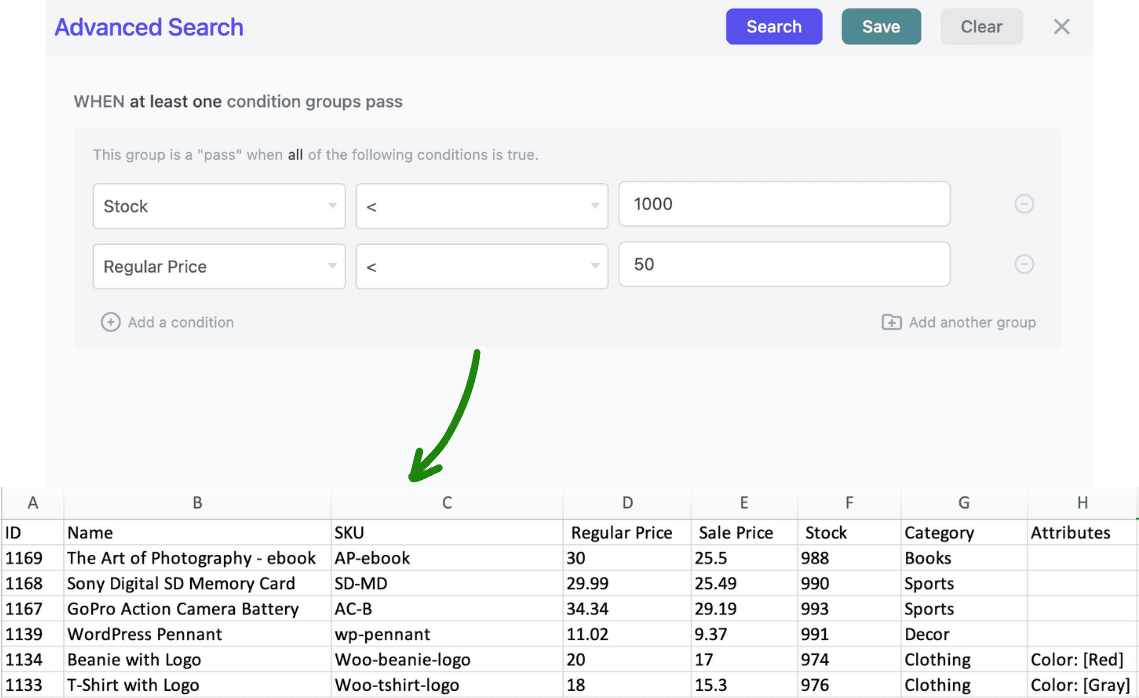
Now you have a filtered list of products that need restocking.
Check out this guide on WooCommerce export products to learn different ways to use this feature.
Export specific product categories
Let’s say you run a food store and want to review how your Pizza and Burger variations performed last year.
Maybe you’re planning menu changes or promotions, and you need to know which variations will be sold last year.
With Smart Manager, it’s easy:
- Go to
Smart Manager > Products dashboard. - Open
Advanced Search. - Set filter as in the screesnshot
- Make sure the category column is visible.
- Click
Export CSV.
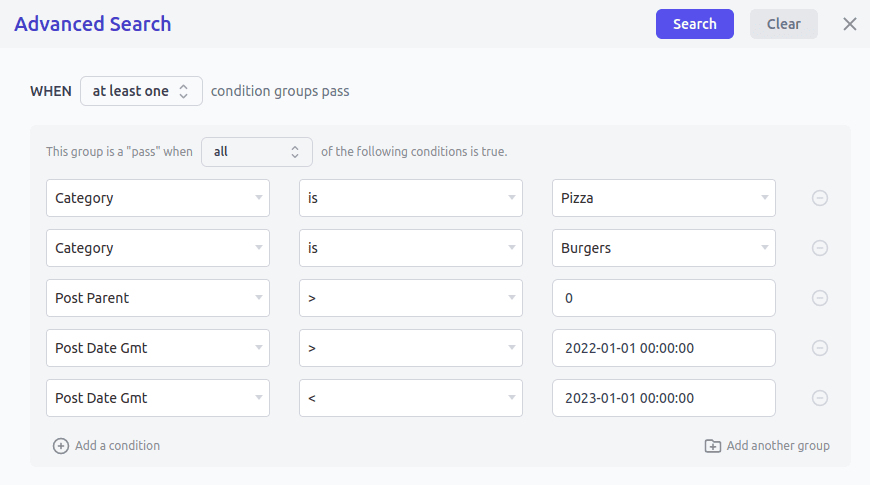
That’s it. A neat, category-specific product export ready for your campaign.
Learn more about WooCommerce product category export here.
Export products based on attributes
Imagine you sell face creams for different skin types and want a list of all creams for oily skin. With Smart Manager, you can do this quickly:
- Go to
Smart Manager > Products dashboard. - Click on
Advanced Search. - Set filter:
Attribute > is > Oily Skin. - Click
Searchand thenExport CSV.
In seconds, you’ve got an organized list of products with the chosen attribute. Learn how to manage product attributes smartly with this guide.
Export WooCommerce orders
Exporting and managing orders isn’t just about having a sales report, it’s about keeping accounting clean, tracking fulfillment and spotting issues early and making better business decisions.
With Smart Manager, you can filter, customize and export exactly the order data you need in just a few clicks.
For example, imagine you want to review all refunded orders from Canada. Refunds are normal in eCommerce, but if they keep coming from a particular country, that’s a red flag worth investigating.
Here’s how to do this:
- Go to your
WordPress dashboard. Navigate to Smart Manager > Orders dashboard. - Click on
Advanced Search. - Select condition as –
Shipping Country > is > Canada. - Click on
Add a condition. - In the new row, select
Status > is > Refunded. - Click
Search. - Locate
Export CSVbutton at the top and click it. - Select
Selected Records.
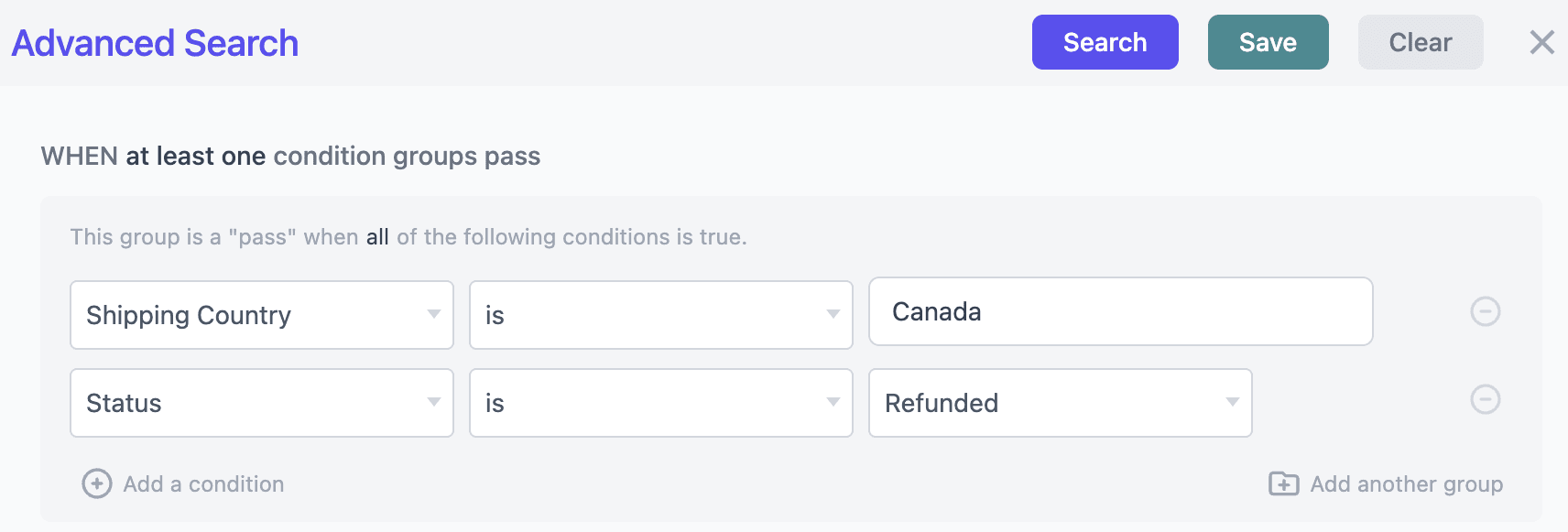
In seconds, you’ll have a ready-to-use list of Canadian refunds.
Not only this, you can export orders based on payment methods, order date, email and more. Check out this guide on WooCommerce order export.
Automate WooCommerce export orders
Sometimes you don’t just want a one-time export, you need your orders sent out regularly without lifting a finger.
That’s where Smart Manager’s scheduling option helps.
For example, say your accountant needs a list of all Completed orders every 30 days.
Here’s how to set it up:
- Go to
Smart Manager > Orders dashboard. - Under
Export CSV, clickSchedule Export. - In the dialog, set:
Start time > today’s date.Interval > every 30 days.Email to > your accountant’s email address.Order status filter > Completed
- Click
Create.
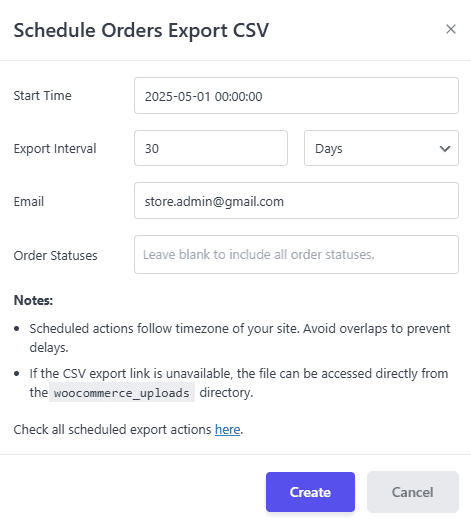
Done. Smart Manager will now automatically generate and send the orders CSV every month.
You can also manage multiple schedules with different intervals and recipients, so the right people always get the right data on time.
Learn more about scheduling order export here.
Export WooCommerce users and customers
Customer exports aren’t just spreadsheets, they’re the foundation of targeted marketing, loyalty rewards and better engagement.
By segmenting and exporting the right customers, you can run campaigns that actually connect.
For example, you’re planning a 4th of July sale and only want to reach customers based in the US.
Instead of scanning through orders one by one, Smart Manager makes it simple:
- Go to
Smart Manager > Users dashboard. - Open
Advanced Search. - Set the filter:
Billing Country > is > US. - Once results load, select them and click
Export CSV.
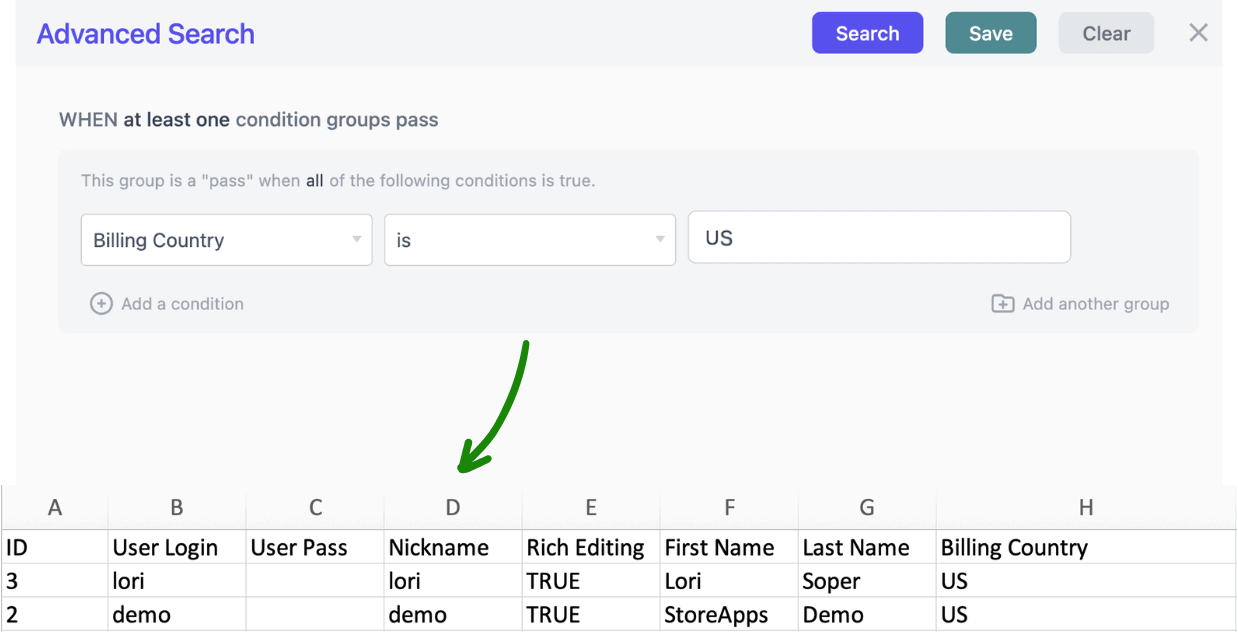
You now have a clean list of US customers ready for your Independence Day promotion.
Not only this, you can also export customers by order count, lifetime spend, last purchase date and more.
Learn more about WooCommerce customer export with Smart Manager.
Export WooCommerce coupons
Coupons drive sales, but managing them in bulk or reviewing performance before a big campaign can be a headache.
Smart Manager lets you quickly filter and export exactly the coupons you need, so planning the next promotion is easier.
Say you’re preparing for a major holiday sale and want to see how your past coupons performed before launching new ones.
Here’s how you can do this with Smart Manager:
- Go to
Smart Manager > Coupons dashboard. - Click
Advanced Search. - Add filters like:
Usage Count > 20to find popular couponsDiscount Typeto separate fixed vs. percentage.Coupon Amountto review discount values.
- Click
Export CSVto download the filtered list.
Now you have a clear report of coupon performance that helps decide which codes to reuse and adjust.
Don’t just stop here, learn how you can use WooCommerce export coupons in different ways to boost sales and performance.
Export WooCommerce subscriptions
Subscriptions are a steady source of revenue, and exporting them helps you track renewals, cancellations and active customers more effectively.
For example, you want a list of all active subscriptions so you can check how many paying customers you currently have.
Here’s how to do this:
- Go to
Smart Manager > Subscriptions dashboard. - Click
Advanced Search. - Set the filter:
Status > Active. - Click
Search, thenExport CSV.

Now you’ve got a CSV with all active subscribers.
You can repeat the same process for other statuses like Cancelled or Pending Cancellation to get a complete picture of your subscription base.
Check out this article to see what else you can export using the Subscriptions dashboard.
Export WordPress posts and pages
Exporting posts and pages can be handy for content audits, for example, to spot underperforming articles that don’t get much engagement.
Let’s say you want to find all posts with comment count ≤ 5 so your team can review and improve them.
Here’s how to do this:
- Go to
Smart Manager > Posts dashboard. - Click
Advanced Search. - Set the filter:
Comment Count > <= > 5. - Click
Search, thenExport CSV.
Now you’ve got a list of low-engagement posts, ready for your content team to optimize.
Export WooCommerce bookings
If you run a business with bookings, like appointments, classes, or events, exporting them helps you manage schedules and customer details more easily.
For example, you want to export all bookings scheduled for today to share with your staff.
Here’s how to do this:
- Go to
Smart Manager > Bookings dashboard. - Click
Advanced Search. - Set the filter:
Booking Date > today. - Click
Searchand thenExport CSV.
Now you’ve got a CSV of today’s bookings that you can print, share, or use for reporting. Learn more about managing WooCommerce bookings here.
Export WooCommerce memberships
Membership exports help track who’s still active, whose plans are expiring and which customers might need renewal reminders.
For example, you want to export all members in your Gold Membership plan so you can extend their benefits.
Here’s how to do this:
- Go to
Smart Manager > Memberships dashboard. - Click
Advanced Search. - Set the filter:
Plan > is > Gold Membership. - Click
Search, thenExport CSV.
Now you have a ready list of your Gold members, complete with expiry dates and details.
Learn more about managing WooCommerce memberships here.
From messy CSVs to smart exports
Exporting is part of running any WooCommerce store, products for inventory, orders for accounting, customers for campaigns, coupons for promotions.
But with WooCommerce’s default exporter, you often end up with half-baked CSVs, limited filters and hours of cleanup.
Smart Manager takes the pain out of it. From advanced search to unlimited records, from products and orders to memberships and bookings, you can export exactly what you need in just a few clicks.
Don’t let messy spreadsheets slow you down.
FAQs
- What file formats (CSV, XML, XLSX, JSON, etc.) are supported for exports in WooCommerce?
WooCommerce by default only supports CSV exports. With Smart Manager, you can export clean CSV or Excel files in one click. - Are there privacy/GDPR considerations when exporting WooCommerce customer or order data?
Yes. Always export and share customer/order data responsibly, only with authorized people and for legitimate business purposes to stay GDPR-compliant. - Is there a limit to how many records I can export at once with Smart Manager?
No. Smart Manager handles thousands of records at once without timing out, unlike the default WooCommerce export. - Can WooCommerce exports be sent directly via email or to cloud storage?
WooCommerce itself doesn’t support this, but Smart Manager lets you schedule exports via email so files land directly in your inbox. - Can I export WooCommerce custom fields or meta data?
Yes. WooCommerce default export doesn’t support this, but Smart Manager lets you export custom fields and meta data easily. - Can exports be filtered by conditions (price, stock, customer country, etc.)?
Absolutely. With Smart Manager’s advanced search, you can set filters before exporting, so you only get the data you need.
